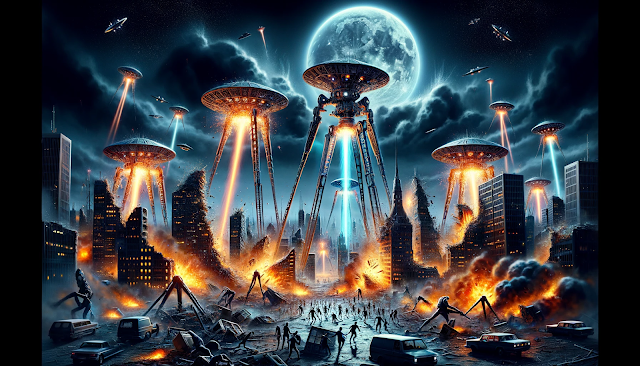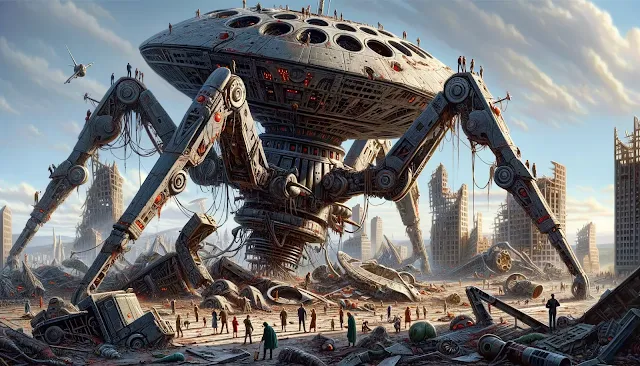Diverging significantly from H.G. Wells' original novel, the film posits that alien invaders visited Earth in prehistoric times, planting their war machines deep underground and biding their time until the human population grew sufficiently. This concept not only imbues the invaders with strategic foresight but also casts a profound shadow of existential dread over the entirety of human history.
Spielberg's adaptation thus transcends the typical sci-fi narrative, inviting viewers to ponder deeply over humanity's place in the cosmos, the ethics of consumption and predation, and the chilling idea of humans as unwitting livestock in a cosmic scheme.
The Prehistoric Context and Strategic Patience of the Aliens
The aliens' visit to Earth during prehistoric times and their decision to wait until the human population reached sufficient numbers suggests a level of strategic patience and foresight that is almost unfathomable. This long game played by the aliens indicates not just advanced technology, but a profound understanding of biological and sociological evolution.The aliens, having observed the slow but steady growth of human civilization, might have calculated the optimal time for their return, ensuring maximum yield from their 'harvest'.
The idea that humanity has been under alien surveillance throughout its history adds an eerie layer to our understanding of human progress. Under this interpretation, every human achievement, every step forward in civilization, has been shadowed by the impending doom of alien harvest. This notion subverts the idea of human progress, suggesting that our advancements may have unknowingly made us more appealing or accessible to the invaders.
The idea that humanity has been under alien surveillance throughout its history adds an eerie layer to our understanding of human progress. Under this interpretation, every human achievement, every step forward in civilization, has been shadowed by the impending doom of alien harvest. This notion subverts the idea of human progress, suggesting that our advancements may have unknowingly made us more appealing or accessible to the invaders.
This interpretation invites viewers to contemplate the ethical and philosophical parallels between the aliens' treatment of humans and the way humans treat other species. Just as humans farm animals for consumption, the aliens, in this interpretation, farm humans.
This parallel forces a reflection on the nature of predation and the ethics of consumption, raising uncomfortable questions about humanity's own practices.
Finally, this interpretation emphasizes the insignificance of humanity in the broader cosmic order. In a universe vast and ancient, the idea that Earth and its inhabitants could merely be a resource for more advanced beings is both humbling and terrifying.
The Psychological Impact and Existential Dread
The psychological impact of this interpretation on both the characters in the film and the audience is profound. For the characters, the realization that their entire existence might have been in preparation for alien consumption would be a devastating blow to their understanding of the world and their place in it. For the audience, this notion introduces a deep existential dread. It challenges our perception of human significance and autonomy, presenting humanity not as masters of their own destiny, but as pawns in a larger, more terrifying cosmic game.Finally, this interpretation emphasizes the insignificance of humanity in the broader cosmic order. In a universe vast and ancient, the idea that Earth and its inhabitants could merely be a resource for more advanced beings is both humbling and terrifying.
It raises questions about the search for extraterrestrial life and our place in the universe.
Are we alone, unique and significant?
Or are we just one of many species, subject to the whims of more powerful cosmic entities?
Firstly, it's possible that during their initial visit, the aliens employed more advanced protective measures against Earth's environment, perhaps due to a heightened awareness of potential biological threats. Over time, these precautions might have been relaxed, leading to their vulnerability in the film. Additionally, Earth's microbiological landscape would have undergone significant changes over thousands or millions of years. The pathogens encountered during the aliens' first visit would likely have been different from those present during their invasion, suggesting an evolutionary mismatch between the aliens' defenses and modern microorganisms.
Another aspect to consider is the nature of their initial visit. It might have been brief and operationally limited, with the aliens minimizing their exposure to the environment, possibly remaining within their spacecraft or donning protective suits. Alternatively, the aliens themselves might have experienced biological changes between their visits, rendering them more susceptible during the events of the film.
From a narrative standpoint, the concept of the aliens succumbing to Earth's bacteria serves as a crucial plot device and a form of poetic justice, underscoring the invaders' hubris. This detail, while central to the climax, remains unexplained in the film, offering room for various interpretations and discussions.
A point of order!
The theory suggesting that alien invaders had visited Earth in prehistoric times to plant their war machines raises a thought-provoking question: why were these aliens not affected by Earth's microorganisms during their initial visit, unlike their eventual demise in the film?
Several speculative explanations can be considered to address this conundrum.
Firstly, it's possible that during their initial visit, the aliens employed more advanced protective measures against Earth's environment, perhaps due to a heightened awareness of potential biological threats. Over time, these precautions might have been relaxed, leading to their vulnerability in the film. Additionally, Earth's microbiological landscape would have undergone significant changes over thousands or millions of years. The pathogens encountered during the aliens' first visit would likely have been different from those present during their invasion, suggesting an evolutionary mismatch between the aliens' defenses and modern microorganisms.
Another aspect to consider is the nature of their initial visit. It might have been brief and operationally limited, with the aliens minimizing their exposure to the environment, possibly remaining within their spacecraft or donning protective suits. Alternatively, the aliens themselves might have experienced biological changes between their visits, rendering them more susceptible during the events of the film.
From a narrative standpoint, the concept of the aliens succumbing to Earth's bacteria serves as a crucial plot device and a form of poetic justice, underscoring the invaders' hubris. This detail, while central to the climax, remains unexplained in the film, offering room for various interpretations and discussions.

















